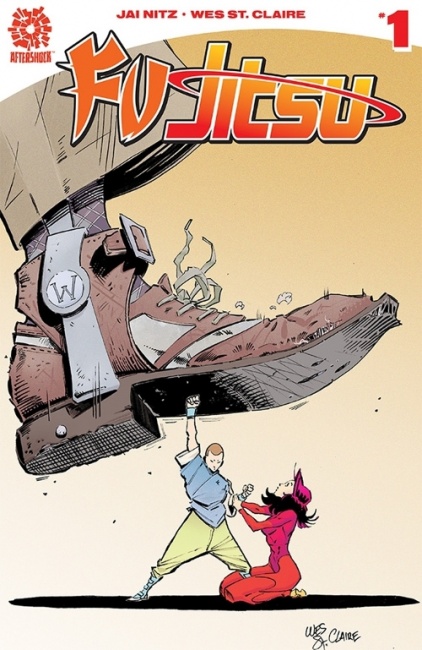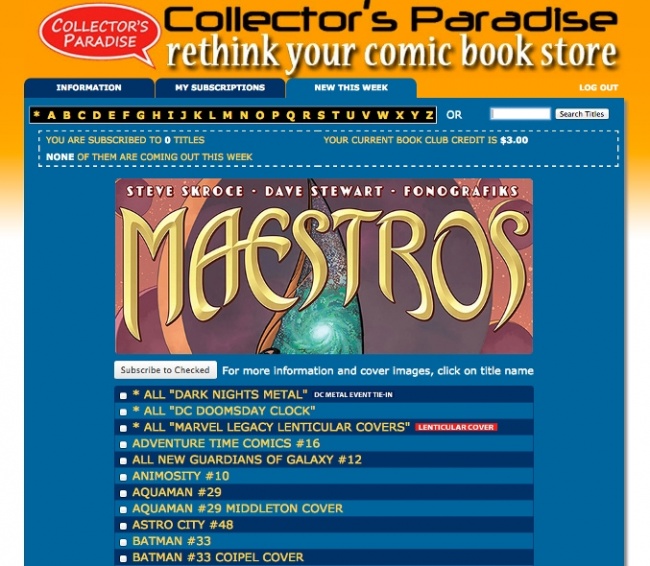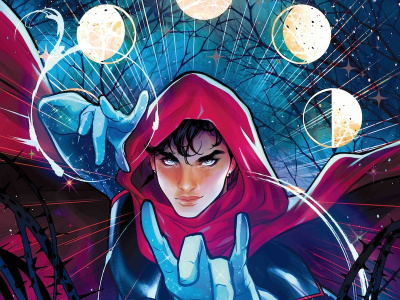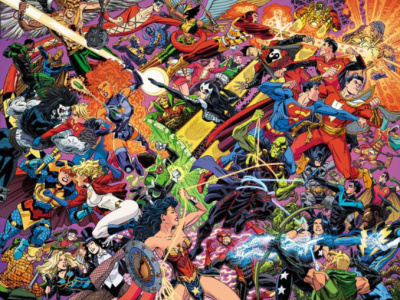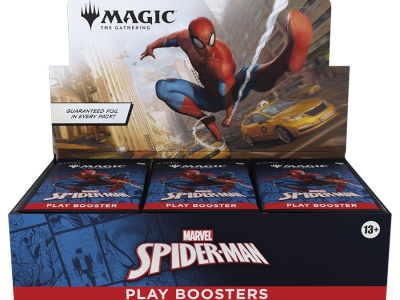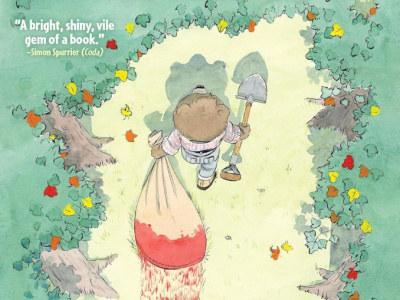Columnist Jim McLauchlin tracks his desire for a single comic through the direct distribution system to find why it wasn’t in the store when he wanted it, and what can be done about it.
Today, I am Jimmy Consumer. And Jimmy Consumer is a bit miffed. Go with me here:
Wednesday, September 27 was release day for Fu Jitsu #1 from Aftershock Comics. Not the biggest of debuts, but hey—it’s written by Jai Nitz, who’s a buddy, and it seems an interesting concept. It became appointment buying for me. Right there on the calendar: "Go to comic store, buy Fu Jitsu."
I live in Los Angeles, a well-appointed city of some 4 million people, and went to a well-appointed comic store, Collector’s Paradise in Winnetka. Hey, they’re so well-appointed, they recently expanded with a second location in Pasadena.
The Friendly Neighborhood Store Manager at Collector’s Paradise wasn’t sure what Fu Jitsu was. He told me they don’t order everything from Aftershock. He looked it up and sure enough, order = 0. He offered to order one for me, and told me it would arrive in two weeks. I availed myself of this opportunity.
Not everyone would have. Who’s gonna make a special trip, two weeks later, to spend four bucks? In many, perhaps most instances, this would have been opportunity lost. And suddenly, the bug in the comic book ecosystem revealed itself.
It’s easy as hell for every publisher to say, "Please order a billion copies."
It’s easy as hell for the talent to say, "Please do what the publisher says and order a billion copies."
It’s easy as hell for every retailer to say, "I want just-in-time inventory on everything, and just-in-time is when I say it is."
It’s easy as hell for the distributor to say, "I’d love to order a billion copies, and I’d love to give all our retail accounts just-in-time inventory, but have you seen our warehouse with a kajillion SKUs?"
And when your thing isn’t there, it’s easy as hell for the consumer to say, "I tried to love you with money. Why won’t you let me?"
Retail today is specialized, and fast: There are literally more than 1000 ways to order a cup of coffee at Starbucks. Amazon Prime gets you free 2-day shipping of Cheetos and socks. Target is offering curbside pickup. Hell, even the drive-through window isn’t fast or convenient enough anymore. DoorDash will bring McDonalds or Jack-in-the-Box right to your home. In this era of hyper-speed and hyper-specialization, can direct market comic stores compete and survive?
Short answer: Yes. Longer answer: Yes, but it’s tough.
"Comic shops have been competing for a while with other forms of retail that can provide product quicker and sometimes cheaper. And I guess that would be Amazon, right?" asks Roger Fletcher, VP of sales and marketing at Diamond Comics Distribution. "But I think comic book specialty retail is already at a place where a lot of other retail wants to get. They are already based on experience. The customer values the community, not just the transaction for product."
Fletcher admits that the quest for Just One Comic can be horribly inefficient.
"Picking one comic to send to one retailer and then having that retailer give it to you is not economical," he says. "But in the larger context of our business relationship with the retailer and the retailer’s relationship with the customer, it can become worth it."
Fletcher says Diamond does what it can to make the process easier, and offer options: Diamond can fulfill reorders through direct ship, which gets to retailers quicker at a higher freight cost, or retailers can choose to have reorders combined with a subsequent shipment.
On the Diamond end, that one copy of Fu Jitsu is worth about 80 cents. And Diamond certainly will pick-and-pack it from their kajillion SKUs. Actually, after Fletcher tabs through some spreadsheets and does some addition, he comes up with a slightly more specific number.
"The proliferation of SKUs have made the business more challenging," he says. "We currently have well over 50,000 SKUs." Diamond arranges their most popular SKUs in an area where most people are doing the labor in their warehouse to improve internal efficiency.
But still, someone is doing single copy pick-and-pack from pallet 12, Row C, Subsection 4 in Olive Branch, unless the store orders it from the jump. Batman and DC Comics is one thing. Fu Jitsu and Aftershock is another.
"We tried Aftershock initially, all the titles," says Ed Greenberg, owner of the Collector’s Paradise stores. "But we’ve seen general malaise toward them. And it’s not just them, it’s many of the similar small publishers."
Collector’s Paradise stocks almost nothing in terms of Aftershock single issues.
"We’re more a comic book store, not a comic book store, if you get the difference in my voice," Greenberg says. "We sell more graphic novels. Aftershock has great creators and their graphic novels can move well for us, but we usually don’t carry Aftershock in single issues."
Greenberg says it’s nothing personal, and his stores can and will do well with non-Marvel and DC stuff.
"There are Valiant titles where we sell 60-70 copies a month, and I know other stores locally are selling 2-3," he says. "So we can do well with smaller publishers. But it’s a lot of hit and miss, and what we can push."
Hello? Paging those 50,000 SKUs from an 870-page (literally!) monthly catalog. The volume itself is a chokepoint.
"As much as you might think, ‘I want to promote this, I want to promote that…’ if three of these things come out in the same week, it becomes impossible,” Greenberg says. "You have to pick and choose. You usually have, literally, 10 seconds in front of a customer to introduce them to a new thing before they have to get going home or back to work. So we pick a few things that we’re really going to try to push long term, and so much of the rest is subs plus a few copies, scheduled to sell out in 7-10 days. 90% of what we’re ordering sells out in 7-10 days."
Jai Nitz, writer of Fu Jitsu, knows all about that. Nitz owns a small interest in Boom Comics, with two stores in Lawrence and Topeka, Kansas, and he keeps an office at the Lawrence location.
"I know how retail shops work," he says. "Retailers usually care only about three things: Does it sell out on Wednesday? Does it sell out on Saturday? Or can it have any value as a back issue?"
Nitz gets the crunch and that the sheer volume of product can be overwhelming. Still, he takes issue with someone not ordering Fu Jitsu #1.
"Aftershock is hiring name creators—here’s Garth Ennis, here’s Warren Ellis, here’s Tony Harris," he says. "So a retailer not ordering a new #1 from a publisher on the grow… that bothers me a little bit. I want to know everything about your ordering process."
Good news: A love connection is possible. Ed Greenberg invites publishers to his monthly ordering meetings with his store managers. Reps from Valiant and BOOM have taken him up on it in the past, and he invites Aftershock to attend if and when they have the chance. The meetings are where the rubber meets the road at Greenberg’s stores.
"In our meeting, we literally decide on titles—what we’re going to focus on, and what will be subs plus a couple copies," he says.
A massive key to Collector’s Paradise’s order numbers? Those coveted advance orders.
"It’s always good to order in advance, or at least talk to us about it," Greenberg says. "The more people talk to us about a book, especially if they say they want to subscribe to it, the more likely we’ll stock it and get behind it."
Collector’s Paradise has an advanced point of sale with a consumer front end accessed online. Customers can order books from the store three months in advance, and subscribe.
"So if we see 3, 4, 5, 6 people subscribing to a new book, we’ll say, ‘Okay, there’s interest,’" Greenberg says. "Conversely, if no one signs up for a new book, we assume there’s a reason for that, too. We gather data, and we base our decisions on data. It’s never personal. When our customers respond ahead of time, we respond."
It’s one thing if that new book is a Batman spinoff. It’s another thing if it’s Fu Jitsu. Back on the Diamond end, Roger Fletcher recommends publishers use their social media tools and attend shows to generate consumer awareness, which hopefully translates to sales.
Nitz thinks he and Aftershock did "almost everything we could" to generate that consumer awareness. Aftershock sent a full .pdf of the first issue to all retailers on its email list, and Nitz personally emailed 200-300 retailers himself. He did interviews with comics media, and participated in videos for Aftershock’s social media. He also handed out cards at cons with order codes for Fu Jitsu #1. The result? About 5500 copies ordered. And something else.
"On an emotional level, to have a big store in a big city that didn’t even order it? Yeah, that’s a kick in the balls," Nitz says. "When you know retail, it makes it easier to take the kick. But still, it bothers me because it is a #1 issue from a known publisher that makes good comics. Have it on hand. If you never had #1, you’ll never sell #2. I know final order cutoff for #2 is a week after #1 hits. If you ordered #1 and it didn’t sell for you, fine. Kill your orders. But give it that chance."
Without that chance, the option becomes the special order. Greenberg admits it’s not the most elegant of solutions.
"Not in the way the Diamond system works," he says. "The system is not set up to cater to you. We do a lot of special orders. Every month, we have 100-200 special order items. But it takes two weeks to get them. And that delay takes a lot of people out of the game. They don’t want to wait. And if a special order isn’t filled, and that happens a lot, that makes us look bad in front of our customers. When special orders don’t get filled from our distributor after three, four weeks, there’s not much we can do but shrug."
The future? It might look a bit like Collector’s Paradise’s own subscription site, but writ large.
"PreviewsWorld.com has a search that allows consumers to see what’s coming out this week, this month, or to search by genre and other factors," Roger Fletcher says. "We’re not there yet, but we’re close to allowing the consumer to place an order with a retailer of their choice. We see this as an upgrade for the e-commerce age."
And if a store wants to eliminate itself as the middleman and speed up the process (at a lower profit margin)? That’s on Diamond’s map as well.
"We’re also looking in the direction where if you go to a store for Fu Jitsu #1 and the store doesn’t have it, they can say, ‘Hey, we can get that sent direct to you from our supplier, right to your door.’ Diamond can perhaps facilitate that sale for them,” Fletcher says. "It might not be at the same margin the store usually gets, but there would be something in the middle for that retailer. Again, we’re not there yet, but I can envision that as a possible future."
So on Thursday, October 12, 15 days after release, Jimmy Consumer got his copy of Fu Jitsu #1. No bones were broken, no teeth were gnashed, no animals were harmed in the production, and all it cost was an extra 4.8 miles as the Google Maps flies. Maybe it’s just the ultimate in First World Problems. And maybe there’s a happy ending.
The Friendly Neighborhood Store Manager at Collector’s Paradise handed the copy over to Jimmy Consumer with a smile and said, "Hey, you know, I flipped through this because you seemed so interested. Looks pretty cool. I’ll keep an eye on this."
And Jimmy Consumer signed up for Collector’s Paradise’s subscription service.
The opinions expressed in this column are solely those of the writer, and do not necessarily reflect the views of the editorial staff of ICv2.com.
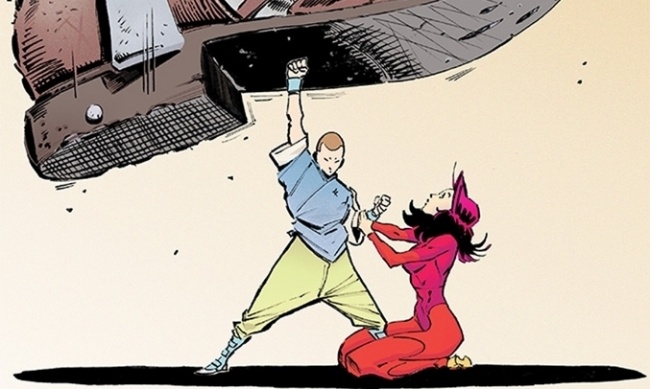
Column by Jim McLauchlin
Posted by Jim McLauchlin on October 18, 2017 @ 4:38 am CT
MORE COMICS
A Trip Down the Witches' Road Reveals Secrets About His Legacy
August 21, 2025
To save his husband, Hulkling, Wiccan takes a journey down the Witches’ Road and learns more about his powers.
From DC Comics
August 21, 2025
DC Comics has unveiled more details surrounding comic book event DC K.O. #1, launching on October 8, 2025, including a "Lights Out" polybagged foil variant program.
MORE COLUMNS
Column by Jeffrey Dohm-Sanchez
August 21, 2025
ICv2 Managing Editor Jeffrey Dohm-Sanchez continues to take a look at some of the issues revolving around Universes Beyond products.
Column by Rob Salkowitz
August 19, 2025
For Horror Week, columnist Rob Salkowitz asks whether the horror boom can help get us through a moment full of woe and dread.




